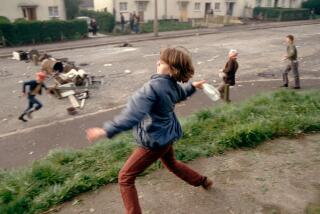Outside Wake for Slain Boys, the Sound of Marching Feet
- Share via
RASHARKIN, Northern Ireland — Christine Quinn stood broken and barefoot by the coffins of three of her young sons as the linoleum floor beneath her shook with the drumbeat of Protestant marchers on one of hundreds of fife-and-drum parades across Northern Ireland on Monday.
Quinn, 29, stared unblinkingly at the small white caskets topped with snapshots of the smiling boys who loved bicycles and soccer--and who burned to death in what police call a sectarian hate crime. She did not speak, but her mother did.
“There’s not too many grieving here. There’s a parade out there,” Irene Quinn said, nodding toward the Protestant celebration less than 50 yards from her grandsons’ wake.
Two men were detained for questioning in connection with the firebombing deaths of the Quinn boys, ages 11, 10 and 9, in Ballymoney on Sunday, an attack against a mixed Protestant-Roman Catholic household that took the fight out of more than a week of Protestant protests and reined in threats of widespread violence in this province.
Police said that the Orange Order’s annual marches commemorating the 17th century military victory by Protestant King William of Orange over the Catholic King James II came off without incident. The members of the fraternal organization were divided and, in some cases, chastened by the deaths of the children after eight days of Protestant demonstrations.
The Orangemen have been protesting a June 29 decision by the government-appointed Parades Commission to reroute one of their marches away from a Catholic neighborhood in the divided city of Portadown. Protestants say that changing their traditional route was an affront to their heritage and a violation of their human rights. Catholics, on the other hand, view the unwelcome marches through their neighborhoods as triumphalism and a slap at Catholics.
The issue is but a symbol for the centuries-old animosity between the region’s Protestant majority, which considers itself part of Britain, and a Catholic minority that wants the province united with the Republic of Ireland.
This year’s Protestant “marching season” is a test of the Good Friday peace agreement that seeks to end 30 years of sectarian violence, replacing it with a local government in which the two groups share power and resolve their differences democratically.
The Orangemen, who reject the peace agreement as a sellout to Catholics, denounced the killings of the Quinn boys and denied any responsibility, saying the firebombing was the work of sick hooligans or Protestant paramilitaries.
The firebombing of the Quinn household before dawn Sunday was but one of 137 attacks on Catholic or mixed homes and 625 gasoline bombings that the Royal Ulster Constabulary has logged in eight days. Police have made 266 arrests and fired 823 plastic riot-control bullets. Seventy-six police officers have been injured.
Like so many of the targets, the Quinns appear to have been hit because they were a mixed family. Grandmother Irene Quinn was a Protestant by birth who married a Catholic and raised her children as Catholics. In the face of sectarian threats, last week she moved out of the predominantly Protestant Carnany Estate in Ballymoney, 40 miles northwest of Belfast.
Christine Quinn had divorced the Catholic father of her four sons and was living with her children and a Protestant boyfriend in the Carnany Estate. The Quinn boys went to a neighborhood school with Protestant children, but three of them were killed as Catholics and will be buried as Catholics today. The eldest, 12-year-old Lee, had been spending the night at his grandmother’s house.
“She [Christine] has so much hatred for the Protestants who done this, that’s why she wanted them to be buried Catholic,” said her uncle, Harry Patton.
“I don’t blame her. And I’m a Protestant. . . . God only knows, she’ll never get over this. Never. She even heard the wee boys screaming. How do you ever get that out of your mind? You hear the wee’uns screaming at night, and that’s the last you hear of them,” Patton said.
As Patton spoke outside Irene Quinn’s house in Rasharkin, hundreds of Orangemen marched to their own music, apparently unaware of the wake. Thousands of Orange Order supporters watched the paraders amid curbside umbrellas, lawn chairs and strollers.
In Portadown, meanwhile, many of the 1,000 Orangemen who turned out in a driving rain to march acknowledged that the killings had reduced their numbers.
Moderation prevailed on Belfast’s Lower Ormeau Road, another flash point over the years. A few hundred members of the Orange Order walked to the beat of a single drum past Catholic protesters who released black balloons in memory of the dead children.
Though only 4,000 people were on the outskirts of Portadown at midnight--a fraction of the 100,000 that Orange Order officials had predicted--hotheads again overnight clashed with security forces, showering them with gas bombs. The standoff clearly was not over.
The Orange Order had called for a period of silence at all gatherings as a mark of respect.
“What we want today is a peaceful day throughout the province,” grand secretary John McCrea said.
But for the Quinn family, there was no peace. Asked what she sought for her grandsons’ killers, Irene Quinn said solemnly: “That they suffer as we are suffering.”
*
Miller reported from Rasharkin and Dahlburg from Portadown.
More to Read
Sign up for Essential California
The most important California stories and recommendations in your inbox every morning.
You may occasionally receive promotional content from the Los Angeles Times.













